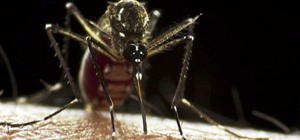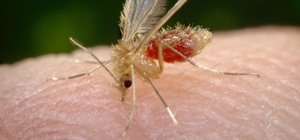The theme for 2017's World Malaria Day, which is today, April 25, is "End Malaria for Good." For many Americans, this might seem like an odd plea. Especially since Malaria is seemingly an obsolete problem here. However, on World Malaria Day, it's important to remember the danger of malaria is still very much present in the US. And around the world, the disease is at the epicenter of a global crisis.
Malaria is a disease that is commonly contracted by humans through mosquito bites. The malaria parasite begins rapidly reproducing within red blood cells and causes a flu-like illness complete with a fever and chills. Although it is usually curable, undiagnosed malaria — if left untreated — can cause severe complications. These complications can be as severe as anemia, acute respiratory distress syndrome, acute kidney failure and sometimes death.
In the past 15 years, new malaria cases and deaths have dropped by 41 and 60 percent respectively, totally to 212 million new cases and 429,000 deaths. In the US specifically, malaria was virtually eliminated in the 1950s, when insecticides, drainage ditches, and window screens became commonplace across the country.
While these gains should be recognized and lauded, this does not mean Americans should stop being concerned with disease. There's still a lot of work let to do both here and abroad.
Malaria in the US
In the 1970s, there were only a few hundred cases of malaria in all of the US. Logically, it would follow that these numbers have stayed steady or decreased with the modern medicine. However, the American Journal of Tropical Medicine and Hygiene recently published a new study that found an estimated 1,500 people are now hospitalized with malaria each year in the US.
Diana Khuu, an epidemiologist from the University of California, Los Angeles, speculated that these cases come from travelers who neglect to take anti-malarial medication:
We don't know of any active transmission in the U.S. so we assume that these cases are all travelers or immigrants...Definitely the numbers are so high. We do have good anti-malaria medicine that travelers can take but apparently some people are just not using it.
A pediatrician and professor of epidemiology at the Johns Hopkins Bloomberg School of Public Health, William Moss, told NPR that malaria is "still a health issue in the United States," as malaria is "such a major global problem and people are constantly moving from endemic areas in to the United States." Many of these immigrants will travel home to visit family and friends, without realizing they're susceptible to the disease and deadly infection.
The fact that malaria has been seemingly eliminated from the population ironically incurs a greater health threat to those US citizens who contract it now. Many hospitals, both small and large, no longer stock anti-malarial drugs.
With globalization and high rates of travel around the world, as long as malaria exists in high rates in parts of the world, there will always be American travelers who are also at risk.
The Importance of Early Detection
Drug-resistant strains of malaria are becoming a growing problem in countries in the Greater Mekong region in Southeast Asia. There, malaria strains resistant to artemisinin-based treatment have become more and more common. Eight years ago, this resistance was only found in western Cambodia. Now there have been cases in Myanmar, Thailand, Vietnam and Laos.
A highly concerning side effect of drug-resistant malaria is the possibility of it spreading to India and Sub-Saharan Africa, as these are the places where malaria is most deadly.
Although health officials are better prepared in the year 2017, the effects of artemisinin-resistant malaria spreading would be "devastating." Thus, in 2014 the World Health Organization (WHO) introduced rapid diagnostic tests (RDTs) that can detect the disease "even when it is dormant in humans." RDTs have been able to detect between 40 and 50% more cases than the traditional method of testing for malaria. This allows the proper precautions to be taken when someone can still transmit the disease to someone else. This is a more effective way to deal with the dormant disease, rather than the mass administration of drugs that simply encourage new forms of resistance to occur.
While the effects of RDTs on interrupting transmission have not been fully studied as they are relatively new, RDTs seem like the way of the future to hopefully stop the further spread of malaria in its tracks.
New Medications and Vaccinations
Other weapons in the fight against malaria, new anti-malaria treatments, and vaccination, has been the topic of recent research by the National Institute of Health (NIH) and WHO.
International Centers of Excellence in Malaria Research (ICEMRs) and The National Institute of Allergy and Infectious Diseases (NIAID), which is part of the NIH, have teamed up to investigate the aforementioned spread of parasite resistance to artemisinin. They have found "two genetic markers that predict malaria treatment failure." Unfortunately, that doesn't solve the resistance problem, so the groups have begun focusing on research to find and development new anti-malaria drugs. So far they have two drugs in clinical trials: DSM265 cured volunteers with the deadliest form of malarial infection, P. falciparum, and DSM421 has been shown to be effective against both P. falciparum and P. vivax malaria.
WHO is also a pioneer in malaria research, announcing on April 24 that in 2018 they will begin implementing a program testing the world's first malaria vaccine. The vaccine, RTS,S, was developed to help protect children against P. falciparum. It is an injectable vaccine that will be administered first in Ghana, Kenya, and Malawi. The data collected from these countries, where the vaccine will be given to children aged five to seventeen months, will determine the effectiveness of the vaccine in "real life" and whether it will then be used more globally.
The prospect of a vaccination is quite exciting, as it could prevent thousands of deaths, particularly in Africa which has the "greatest burden of malaria worldwide."
On World Malaria Day, it's important to stay cognizant of the current presence of the parasite throughout the world. As a global citizen, the disease concerns all people, but those in the US should not rest easy. Constant vigilance!
Just updated your iPhone? You'll find new emoji, enhanced security, podcast transcripts, Apple Cash virtual numbers, and other useful features. There are even new additions hidden within Safari. Find out what's new and changed on your iPhone with the iOS 17.4 update.


























Be the First to Comment
Share Your Thoughts